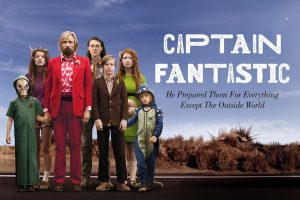
“Captain Fantastic” has all of the ingredients to be a dopey fish out of water comedy. It follows the indoctrination of the Cash family into society after being raised in the forests of the Pacific Northwest. The kids know next to nothing about human interaction, but are skilled survivalists. This is ripe for slapstick material, the kind found in awful comedies such as “Jungle 2 Jungle” in where the kids find it socially acceptable
Matt Ross is too smart for that. His attention isn’t focused on the potential comedy in his material, but the tenderness and understanding of a family adjusting to new surroundings. Don’t get me wrong, there are moments of comedy aplenty, some of which you’d find in those aforementioned fish out of water fables. Their purpose isn’t just to garner a laugh, but to highlight the naivety of the children.
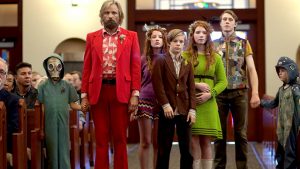
The kids aren’t dumb savages who only understand the art of survival. On the contrary, they’re all quite intelligent. They’ve been raised on high-end literature and the philosophies of Noah Chomsky, so much so they celebrate his day of birth instead of Christmas. They know the inner workings of the judicial system like the back of their hand, more so than the average kid. This is detailed in one scene where the two sons of a “normal” family are asked to describe the Bill of Rights and fail to efficiently do so. One of the youngest of the Cash family, eight year-old Zaja (Shree Cooks), can both regurgitate the official definition as well as rattle off a resourceful opinionated response found normally in elite college students and above.
The humor and social commentary is mined from the hyper-intelligence of the Cash children. The fish out of water element comes more from their ignorance of social queues. Moments such as the children spouting off theoretical breakdowns on Marxism garners the biggest laughs, leeching off of the bewilderment of common folk. There are no sequences, thankfully, of the family gorging on the rotting corpse of a wild animal at the dinner table of the domesticated Dave & Harper (Steve Zahn & Kathryn Hahn, whose pairing must’ve been over the similarities of their last names). The humor there arises from the children’s bafflement over store-bought food and popular shoe brands.
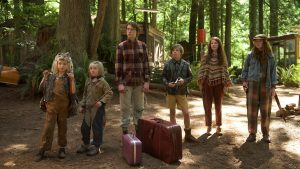
That’s not to say Ross avoids the pratfalls of the fish out of water tale altogether. “Captain Fantastic” has its fair share of cheeky moments, most notably found via the eldest, Bodevan (George MacKay). His interaction with a female teenager, Claire (Erin Moriarty), consists of him awkwardly discussing the works of Bach and missing her signals of flirtation. When the two finally start making out and are caught by her mother (Missi Pyle), his gut reaction is to propose on the spot to avoid any familial trouble. Moments like this are too corny and play out like a necessary evil.
The comedy and outlandishness are reined in by the emotional journey of the father, Ben (Viggo Mortensen). Suffering from the loss of his wife to suicide, he fights with himself on how to continue raising the children. From the outset we see his doubts creeping in of them adjusting to society, such as the way he watches Bodevan interact with females his age when out in public. He despises the consumerism of the real world and the lack of a superlative education, finding more value in learning survival in the wilderness and the dangers of socioeconomics. Still, he realizes the limitations of his lifestyle and fights valiantly to ingratiate his children into society without robbing them of their learnings.
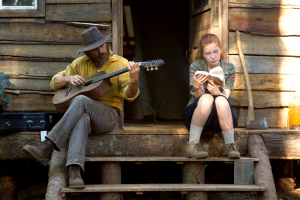
The funeral of the mother is what brings them out of hiding, with Ben protesting the Catholic funeral service held for his late wife that goes against her wishes. She didn’t want to be buried, but cremated and her remains flushed down a toilet (even in the afterlife, she had a sense of humor). Ben knows the risks of such protest, with his strict father-in-law Jack (Frank Langella) threatening police interference if he even shows his face at the service. He’s manipulated by his children to go through with the plan, some wanting to honor their mother and others secretly wanting to escape their father’s grasp.
The rest of the family unit is sporadic in development. Rellian (Nicholas Hamilton) exists solely to protest his father, having knowledge of some of the darker elements of his parents’ marriage. The two oldest daughters, Vespyr (Annalise Basso) and Kielyr (Samantha Isler), exist to pad out the numbers and highlight their father’s eccentricities. And Nai (Charlie Shotwell) exists as comedic relief, pressing his father on the merits of sexual intercourse (he’s only a few years removed from being a toddler, mind you). This at least enriches the development of Ben, showing him as bluntly honest.
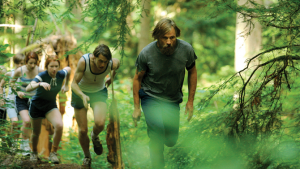
Even when the film succumbs to cheeky humor and a rather mechanical finale, Ross is able to keep it afloat thanks to his tender touch. He is fascinated not by the comedic implications of the situation, but the dramatic nuances found in the family unit. He challenges his audience to think about our flailing education system, all the while highlighting the parlous constraints of harborage. It is this fascination that gripped my attention and never let go, even when Ross started to lose his grasp.
Final Rating: B
